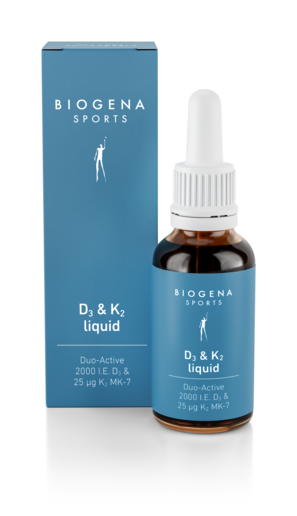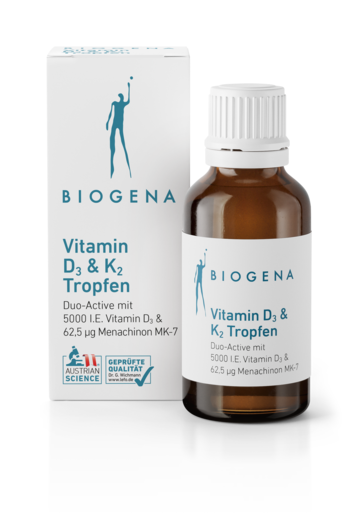Vitamin K
Vitamin K - known as the "bone vitamin" - has other functions in the body. If you want to support your vitamin K intake with food supplements, we offer various mono and combination preparations in capsule and drop form.


Vitamin K – das Multitalent für Knochen, Gefäße & mehr
Team players by nature
Vitamin K is the short form for “coagulation vitamin” – named after its role in the maintenance of blood clotting. But that is not its only role. It is also involved in the formation of substances that are involved in bone metabolism and bone mineralization.
Vitamin K is a pair of siblings with an amazing pedigree: vitamin K1 is preferably found in green plants, vitamin K2 in animal foods and in healthy intestinal flora. However, both sisters are team players by nature: they are involved in the production of protein building blocks that are important for blood clotting, healthy arteries and a stable skeleton.
The K siblings – fat-soluble and heat-resistant, but light-savvy
The fat-soluble vitamin K compounds were discovered by chance by the Dane, Henrik Dam, in 1929. This circumstance explains why the research situation is comparatively clear compared to other vitamins. It has been possible for many of the mechanisms of action of the two K siblings to be substantiated by recent studies (including foreign ones), but they have nonetheless (still) only partially found their way into the official health claims rules of the EU. In general, the two K siblings differ in the following characteristics:
- Vitamin K1 (phylloquinone) is mainly found in green plants, supports photosynthesis in these plants, and plays a significant role in blood clotting by activating protein components. It owes its name to this fact: The “K” stands for “coagulation” in Danish (coagulation), which means blood clotting. In the human body, it only “survives” for about 1.5 hours.
- Vitamin K2 (menaquinone) comes predominantly from animal sources and reaches particularly high concentrations in fermented foods such as aged cheese, dairy products, sauerkraut and fermented soybeans. It can also be formed by certain bacteria in the intestine. Menaquinone occurs in different lengths of “side chains” that decide how well the active substance can be absorbed by the body and how long it is active in the body as a supplier. Menaquinone-7, abbreviated to MK-7, is by far the most effective variant; it remains in the body for up to 72 hours.
- Vitamin K1 and vitamin K2 are fat-soluble and heat-resistant, but very sensitive to light.
These foods contain vitamin K
Due to seasonal fluctuations, there is hardly any reliable information on the vitamin K content in food. However, it can be said that green vegetables in particular are rich in vitamin K, e.g.:
- Spinach
- Swiss chard
- Broccoli
- Cabbage
Chicken and beef also contain vitamin K. Vitamin K is relatively insensitive in food preparation – only UV light can damage the fat-soluble vitamin.
Vitamin K2 Wirkung: Für starke Knochen & flexible Gefäße
Vascular elasticity – menaquinone binds free calcium ions
Vitamin K2 is considered to be the more efficient active ingredient of both K compounds, not only due to its longer retention time in the body but also due to its greater activity potential. The function that menaquinone takes on in the individual blood vessels has been sufficiently investigated: It activates a protein called matrix GLA there (also called MGP, an abbreviation for matrix GLA protein). This now binds free calcium ions, which therefore cannot be deposited on the vessel walls. In a long-term study with several comparison groups, the so-called Rotterdam study of 2004, suggested that a high vitamin K level can have a positive effect on vascular elasticity.
Vitamin K2 Nahrungsergänzung – wenn Ernährung allein nicht reicht
For strong bones – Vitamin K helps with the repair process
Vitamin K is sometimes called the “bone vitamin” – and this classification is not without reason. Menaquinone is an important team player in maintaining a healthy and stable skeleton. A sophisticated plan is normally found underlying bone tissue. Osteoclasts, which are mediators of the continuous destruction of bone, dispose of brittle and/or old bone material. This completely natural repair mode complements the automatic bone formation by the osteoblasts responsible over a long lifespan. They produce the non-collagen protein substance osteocalcin – but only if vitamin K is there to help. Calcium and magnesium are still needed to maintain bone mass and sufficient mineralization of the bone matrix – as well as vitamin D3. Vitamin K2 and vitamin D3 form an intensive friendship when it comes to strong bones.
Best friends in “bone work” – vitamin K and vitamin D
The sensitive balance required to maintain intact bones is essentially composed of mutual dependencies. Calcium and magnesium are ideally available in a ratio of 2 to 1. Vitamin K2 has the task of depositing minerals in the bone – but vitamin D3 must activate the required proteins and also utilize calcium for this to occur. If there is a deficiency in vitamin K2, calcium and magnesium cannot be “sent” into the bones, but are deposited in the cartilage and soft tissues. If insufficient vitamin D3 is available, proteins and usable calcium are missing for bone mineralization. The fat-soluble vitamins K and D both require each other and reinforce each other.
Vitamin K2 kaufen – Teamwork mit Vitamin D
Vitamin K dosage – according to information minimal values
An unhealthy diet and a disturbed intestinal flora with an insufficient number of positive intestinal bacteria can be possible causes for a vitamin K level that is possibly too low. The German Society for Nutrition has set the daily dosage at 65 micrograms for women and 80 micrograms for men – whereby many studies suggest that these values represent the minimum requirement for intact blood coagulation only and tend to neglect the essential importance of vitamin K2 for effective bone metabolism.
Maintain your quality of life and your spirit of adventure
Vitamin K is absorbed from the bloodstream, especially by the liver. Together with its partner vitamin D, it forms the important coagulation factors that positively influence blood flow and blood coagulation. The ability of vitamin K to bind calcium ions contributes significantly to the health of the heart and vessels. Vitamin K and its partner vitamin D also have a decisive influence on bone density and bone mineralization. An optimal supply of vitamin K to the body is therefore essential and beneficial to health. If the intake of food is not sufficient, this can be compensated with a dietary supplement. An overdose is almost impossible since vitamin K is excreted much too quickly. Healthy, strong bones are a prerequisite for enjoying movement and thus a fulfilled mobile life. Maintain your quality of life and your spontaneity through a secure supply of vitamin K. And don’t forget your vitamin D compound.
Fragen zu Vitamin K? Wir helfen dir weiter









